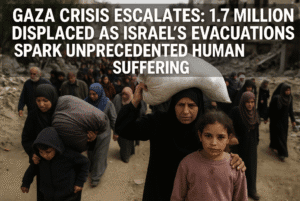Gaza Crisis Escalates: 1.7 Million Displaced as Israel’s Evacuations Spark Unprecedented Human Suffering
The ongoing Gaza crisis has led to the displacement of over 1.7 million Palestinians, with no safe zone left as Israel’s military expands evacuation orders across Gaza City. As families flee one perilous area for another, they face food and medical shortages, ongoing airstrikes, and overcrowded camps. Children are particularly affected, with over 1,000 suffering amputations and widespread trauma.
International legal bodies, including the ICC and ICJ, have begun investigating Israel for potential war crimes. Despite growing international condemnation and pressure, Israel continues its offensive, with critics labeling it as collective punishment. The humanitarian crisis is deepening, as aid remains scarce and ceasefire talks stall, leaving Gazans with little hope for a resolution.

Gaza Crisis Escalates: 1.7 Million Displaced as Israel’s Evacuations Spark Unprecedented Human Suffering
As the Israeli military expands evacuation orders across Gaza City, Palestinians face an increasingly dire reality: no corner of the enclave offers safety. On Friday, the army instructed residents of eastern neighborhoods—Al-Jadeedah, Al-Turkman, and Zeitoun—to flee westward, claiming imminent operations against militant activity. Yet, for civilians, relocation often means trading one perilous zone for another, with airstrikes and shortages of food, water, and medical care persisting territory-wide.
A Cycle of Displacement and Desperation
Since Israel resumed its military campaign in March 2024, over 1.7 million Gazans—nearly 80% of the population—have been displaced multiple times. Families evacuating eastern Gaza City now join overcrowded camps in western areas, where makeshift shelters lack basic sanitation. The UN reports that only 15% of needed aid trucks enter daily, while hospitals, reliant on generators after Israel’s siege cut power, face fuel shortages. “We’re surviving on canned food and rainwater,” said Um Ahmed, a mother of four interviewed by Anadolu. “Every night, we pray the bombs don’t find us.”
Children Bear the Brunt
Gaza’s youngest residents endure catastrophic consequences. Over 1,000 children have undergone limb amputations, often without anesthesia, according to the Gaza Health Ministry. Psychologists warn of a “lost generation” grappling with trauma; UNICEF notes 90% of children report depression symptoms. Meanwhile, schools-turned-shelters are not immune to attacks—a strike on a Khan Younis refuge in April killed 27, including 14 minors.
International Courts Step In
The conflict’s toll has spurred unprecedented legal action. In November 2024, the International Criminal Court (ICC) issued arrest warrants for Israeli Prime Minister Benjamin Netanyahu and former Defense Minister Yoav Gallant, accusing them of using starvation as a weapon and intentionally targeting civilians. Simultaneously, the International Court of Justice (ICJ) is deliberating a genocide case brought by South Africa, with over 51,400 Palestinians killed as of April 2025. While Israel dismisses these moves as “politically motivated,” legal experts say the cases could set historic precedents for accountability.
Regional and Global Reactions
The Arab League condemned the evacuation orders as “forced displacement,” echoing Palestinian fears of permanent expulsion. Egypt and Jordan, meanwhile, warn the crisis could destabilize the region further. In the U.S., growing public pressure has not shifted President Biden’s stance, though Congress recently approved $827 million in humanitarian aid—a fraction of Gaza’s needs.
Military Strategy or Collective Punishment?
Israeli officials assert the offensive aims to dismantle Hamas, citing rocket fire and the group’s entrenched networks. However, critics argue the campaign’s scale—over 60% of Gaza’s homes destroyed—constitutes collective punishment. “Evacuation orders don’t absolve Israel of protecting civilians,” stated a Human Rights Watch director. “Pushing people into so-called ‘safe zones’ then bombing them is unlawful.”
The Path Ahead
With ceasefire talks stalled and Rafah’s border crossing intermittently closed, Gazans see little hope. As the world’s courts deliberate, those on the ground face a daily struggle for survival. “Justice won’t feed my children today,” said Mohammed, a father in Deir al-Balah. For him, like millions, the war’s end remains the only lifeline.
You must be logged in to post a comment.